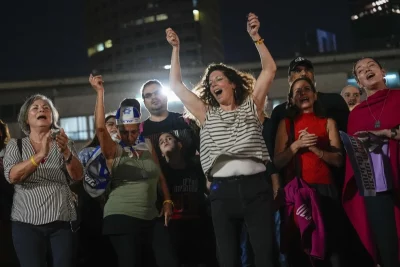Qatari and Egyptian mediators say Hamas agreed to release 13 Israelis and seven foreigners on Saturday in exchange for 39 Palestinians imprisoned by Israel.
The announcement came after Hamas delayed the releases for several hours, saying Israel violated the terms of a truce deal. The deal had set the stage for such swaps.
Saturday marked the second day of the four-day truce.
AP earlier reported that the Hamas group said the Israeli government delayed the expected release of a second group of hostages in exchange for Palestinian prisoners held by the occupier forces for hours on Saturday.
The group accused Israel of not complying with the deal’s terms. The last-minute snag created a tense standoff on the second day of the four-day cease-fire.
Until Saturday afternoon, it still appeared everything was going according to plan.
Aid trucks were entering Gaza, Hamas handed a list of more than a dozen hostages slated for release to mediators Qatar and Egypt, and Israel’s Prison Service prepared a list of dozens of Palestinian prisoners for release.
But by nightfall, as the hostages should have emerged from Gaza, Hamas announced that it was delaying the release, saying Israeli truce violations.
The group alleged the aid deliveries permitted by Israel fell short of what it promised. It added that not enough of the aid was reaching northern Gaza.
Northern Gaza was the focus of Israel’s ground offensive and the main combat zone. Hamas also said not enough veteran prisoners were freed in the first swap on Friday.
“This is putting the deal in danger and we have spoken to mediators about that,” Osama Hamdan, a senior Hamas official, said in Beirut.
While uncertainty around the details of the exchange remained, there was some optimism, too, amid scenes of joyous families reuniting on both sides.
On the first day of the four-day cease-fire, Hamas released 24 of the about 240 hostages taken during its Oct. 7 attack. And Israel freed 39 Palestinians from prison.
Hamas released 13 Israelis, 10 Thais and a Filipino from Gaza.

Earlier Saturday, mediators provided conflicting reports on whether 13 or 14 hostages were set for release.
With three Palestinian prisoners to be freed for each hostage under the deal, Hamas expected Israel to free a corresponding 39 or 42 Palestinians.
Read Related News:
War against Hamas continues after cease-fire – Netanyahu
Israeli-Hamas: Troops fight in north Gaza, hospitals in firing line
Overall, Hamas is to release at least 50 Israeli hostages, and Israel is to let go 150 Palestinian prisoners, during the four-day truce — all women and minors.
But Israel said the truce can be extended an extra day for every additional 10 hostages freed. The U.S. President Joe Biden said he hoped this would occur.
In another report, a Qatari delegation arrived in Israel on Saturday to coordinate with parties on the ground and “ensure the deal continues to move smoothly”, according to a diplomat.
The diplomat spoke on condition of anonymity because he was not authorised to discuss details with the media.
War-weary Palestinians in northern Gaza, the focus of Israel’s ground offensive, returned to the streets. They are seen crunching over rubble between shattered buildings and at times digging through it with bare hands.
At the Indonesian hospital in Jabaliya, besieged by the Israeli military earlier this month, bodies lay in the courtyard and outside the main gate.
For Emad Abu Hajer, a resident of the Jabaliya refugee camp in the Gaza City area, the pause meant he could again search through the remains of his home. Israeli attack flattened his house last week.
He found the bodies of a cousin and nephew, bringing the death toll in the attack to 19. With his sister and two other relatives still missing, he resumed his digging on Saturday.
“We want to find them and bury them in dignity,” Hajer said.
The United Nations said the pause enabled it to scale up the delivery of food, water, and medicine to the largest volume since the resumption of aid convoys on Oct. 21.
It was also able to deliver 129,000 litres (34,078 gallons) of fuel, just over 10 per cent of the daily pre-war volume. UN aid workers also delivered cooking gas, a first since the war began.
In southern Khan Younis, on Saturday, a long line of people with containers waited outside a filling station.
Hossam Fayad lamented that the pause in fighting was only for four days. “I wish they extend the pause until people’s conditions improved,” he said.
For the first time in over a month, aid reached northern Gaza. The Palestinian Red Crescent said 61 trucks carrying food, water and medical supplies headed there on Saturday.
U.N. and Palestinian Red Crescent evacuated 40 patients and family members from a hospital in Gaza City. (AP News)
Do you have a flair for Citizenship Journalism? Share story(ies) of happenings in your area with The NewsZenith on WhatsApp: 08033668669 or thenewszenith@gmail.com